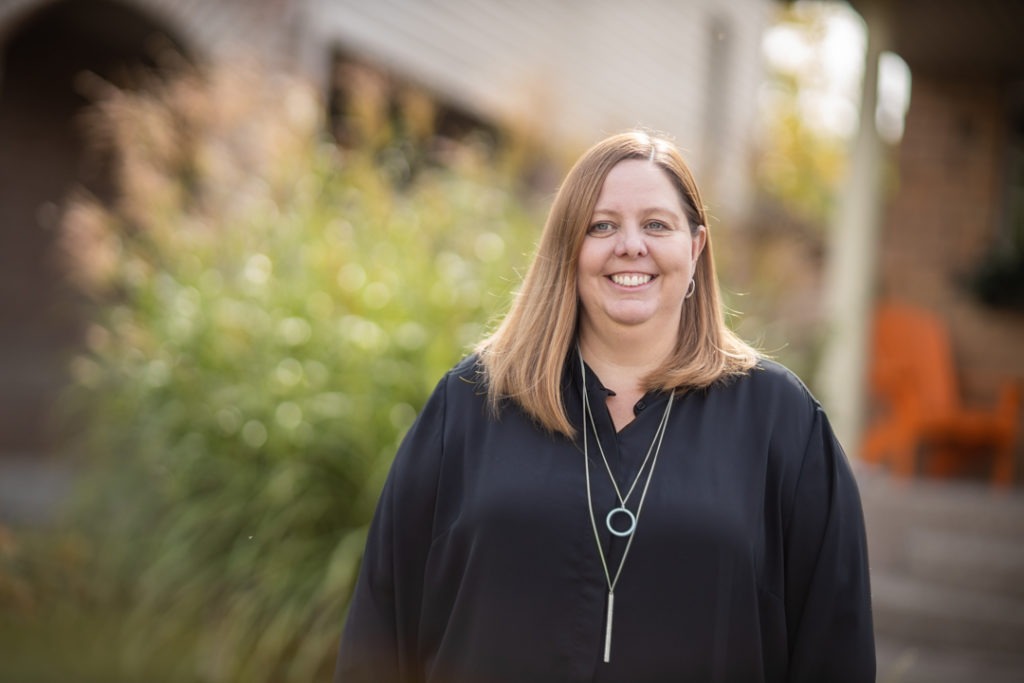
Introducing a social worker in the West Niagara Mental Health clinic
Aprile Titterson has been a social worker with Hamilton Health Sciences for more than 20 years, including the last six years at the West Niagara Mental Health (WNMH) clinic at West Lincoln Memorial Hospital. She provides individual and group therapy treatments to patients struggling with serious mental health challenges.
The clinic, which has been operating for 20 years, consists of an occupational therapist, four social workers, a registered nurse and two psychiatrists. It’s a small team but they make a big impact, treating more than 7,000 people each year who require care for anxiety disorders, mood disorders, people struggling with suicide, post-traumatic stress disorder, and other mental health concerns.
We spoke with Aprile in time for World Mental Health Day on October 10 to learn more about her role and her recent certification.
You recently earned a certification for treating post-traumatic stress disorder and are one of only 25 people in Canada with this designation. What does this mean for you and the clinic?
I decided to pursue the certification because I have come across so many people who have been impacted by trauma in their lifetime. I addressed so many other issues in their lives, but the trauma continued to affect them in so many ways. I wanted to feel more capable and skilled in helping them address this aspect of their history.
The training to become a Certified PE (Prolonged Exposure) Therapist is offered by the Center for the Treatment and Study of Anxiety (CTSA), at the University of Pennsylvania. I feel more confident that I am applying the treatment as it was intended to maximize the benefits to my patients. It is important that the patients feel that they can trust me and the therapy in order to fully engage in the treatment process.
What originally led you to social work?
I always knew I wanted to work in mental health but I didn’t know in what capacity. I originally went to school for psychology but met some social workers in a volunteer placement I was doing. They introduced me to this amazing discipline that I had never considered before. Social work just fit well with me and I have loved the various opportunities it has provided. Although it’s a cliché, I went into social work because I wanted to help people. I have enjoyed every aspect of my career and all the people, patients and staff I have met along the way.
What is your area of focus?
I have worked in several different programs over the years but the consistent theme through all of my work placements has been mental health. I initially started in addictions, then the emergency department and then to a chronic pain clinic. Although the reasons that brought people through the doors might have varied, the underlying struggles remained similar. Mental health was a common factor, just like I frequently see substance use, chronic pain and chronic illness showing up in the mental health clinic. All these issues are correlated.
Who have been your strongest influences?
Since I have been a part of WNMH, I would have to say Christopher Conley, supervisor at the clinic, has been a strong influence. His hunger for education and knowledge is impressive and it’s hard not to want to become a better therapist when you observe someone working so hard not only to improve his own knowledge base but also that of the community around us.
What’s a typical day like?
A typical day is spent providing individual or group therapy. The type of therapy can vary throughout the day. I might see someone who is struggling with depression, then anxiety, followed by someone living with schizophrenia. At WNMH we also offer a number of different group therapies.
During the pandemic we were able to transfer our services to a virtual framework which means we are able to continue meeting with our patients even though we might not be able to do so in the traditional ways.
Because we are a close knit team, we also ensure that we find ways to connect with each other during the day. Each day is a little different.
What do you look forward to most when you come into work?
The best days are when I hear how a patient tried something new we were working on and it went well for them, or when they start to achieve the goals they set for themselves in treatment. Those moments when they have achieved success that they never thought possible is so rewarding.
I also look forward to seeing my work family. We all do such challenging work, it’s nice to have each other for support and encouragement. Our team is a lot of fun.
What’s the most challenging part of your job?
The hardest times are when I feel like I can’t do anything, often because the person is reluctant to accept the help at this time in their life, or those around them contribute to making it hard for them to engage in the treatment.
There are so many factors that might get in someone’s way to fully engaging in treatment. On one hand I can accept this non-judgmentally and it can also be hard to let go at the same time.
What can you say to people who are struggling with their mental health and are hesitant to seek help?
The moments before you ask for help are the hardest, and it’s so worth it to ask. There are so many great treatments out there that can help you live a life with so much less suffering, it’s worth it to reach out to your family doctor and ask for help!
Mental health struggles are much more common than you think, and there are so many different options for help.
Sign up for the West Lincoln Memorial Hospital newsletter for important local stories delivered right to your inbox.
